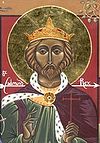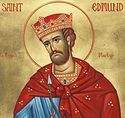

| Previous day | Next day |
| Old Style
November 20
|
Monday |
New Style
December 3
|
|
28th Week after Pentecost.
Tone 2.
Nativity Fast. |
Monastic rule: cooked food, no oil.
|
![]() Forefeast of the Entry of the Most Holy Theotokos into the Temple.
Forefeast of the Entry of the Most Holy Theotokos into the Temple. ![]() St. Gregory of Decapolis (816).
St. Gregory of Decapolis (816). ![]() St. Proclus, archbishop of Constantinople (446-447).
St. Proclus, archbishop of Constantinople (446-447).
Martyr Dasius of Dorostolum in Moesia (284-305). Martyrs Eustace, Thespesius, and Anatolius, of Nicaea (312). Hieromartyr Nerses, bishop of Shahrqart (Kirkuk), and his disciple Martyr Joseph, and those martyred with them in Persia: Hieromartyrs John, Shapur, and Isaac, bishops of Seit Selok; Martyrs Guhshtazad, eunuch, Mari, Sasan, Tima, Noah, and Zaun, of Lashom; and Bautha, Denachis, Thecla, Dinaq, Tatun, Mama, Mazakya, Ana, Abyat, and Hatay (343). Venerable Diodorus the Abbot of Yuregorsk (1633). St. Parasceva (Rodimtseva), abbess of Toplovsky Convent (Simferopol) (1928).
New Hieromartyrs Macarius (Karmazin), bishop of Dnepropetrovsk, Arsenius (Dmitriev), abbot, of the Tikhvin Monastery, Eutychius (Kachur), abbot, of the St. Marcian Skete (Ukraine), and Hilarion (Pisarets), hieromonk of Glinsk Hermitage (1937). New Nun-martyr Ioannikia (Kozhevnikova), abbess of the Convent of the Entry of the Theotokos (Tikhvin) (1937).
St. Isaac, bishop of Armenia (440). St. Theoctistus the Confessor, of Constantinople (855). Martyr Edmund, king of East Anglia (869). St. Sozomen of Cyprus (12th c.).
Thoughts for Each Day of the Year
According to the Daily Church Readings from the Word of God
By St. Theophan the Recluse

Monday. [I Tim. 5:1-10; Luke 17:20-25]
Having said that the Son of Man will appear in his day like lightning, instantly illuminating everything under heaven, the Lord added: But first must He suffer many things, and be rejected of this generation. The word order here makes it apparent that this “must suffer” should precede Lord’s appearance in glory. Thus, the whole time until that day is the time of the Lord’s suffering. He suffered in His person at one known time; after that His sufferings continue in believers—suffering as they are born, their upbringing in the spirit and protection from actions of the enemy, both inner and outer—for the Lord’s union with His own is not just mental or moral, but living. Everything that touches them is accepted by Him as well, as the head. Therefore, it is impossible not to see that the Lord indeed suffers much. The most painful sorrows are the falls of believers; even more painful for Him is when they fall away from the faith. But these are the final wounds; as continuously wounding arrows are the sorrows, temptations, and wavering faith of unbelief. Words and writings that exude unbelief are kindled arrows of the evil one. Nowadays, the evil one has led many blacksmiths to forge such arrows. The hearts of believers ache when they are struck by them and see others being struck. The Lord aches too. But the day of the Lord’s glory will appear—then all the secret darkness will be revealed, and those who have suffered will rejoice with the Lord. Until that time we must endure and pray.
Tuesday. [I Tim. 5:11-21; Luke 17:26-37]
Whosoever shall seek to save his life shall lose it; and whosoever shall lose his life shall preserve it. One must understand it this way: to save your life means to pity yourself, while to lose your life means not pitying yourself—that is, on the path of the Lord’s commandments, or in working for the Lord. So, it is like this: he who works for the Lord, fulfilling His commandments without pitying himself, is saved; but he who pities himself, perishes. If you pity yourself you will unfailingly be found as a transgressor of the commandments and, consequently, an unprofitable servant; and what is the sentence for an unprofitable servant? Cast ye the unprofitable servant into outer darkness: there shall be weeping and gnashing of teeth (Matt. 25:30). Make an effort to watch yourself if only for a single day, and you will see that self-pity distorts all of our [good] deeds and kills the desire to do them. Without labour and effort, you will not be able to do anything; but if you regret forcing yourself—it all stops there. There are things which you must do, whether you want to or not. Such things are done without fail, difficult as they may be. But here self-pity is overcome by self-pity. If you don’t do them, there will be nothing to eat. But since what is required by the commandments are not of such nature, they are always omitted out of s elf-pity. You make condescensions to yourself when it comes to bad deeds, also out of self-pity. You hate to refuse yourself what you want and so the desire is fulfilled, even though it is either outright sinful, or will lead to sin. Thus it always goes with one who pities himself—what he should do, he does not, and what he should not do, he indulges himself in doing; and he ends up good for nothing. What salvation can there be here?






